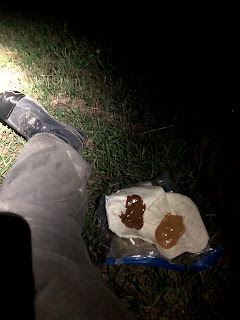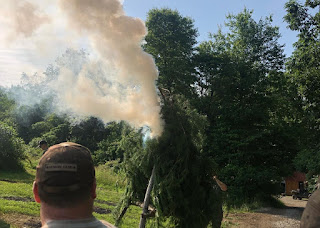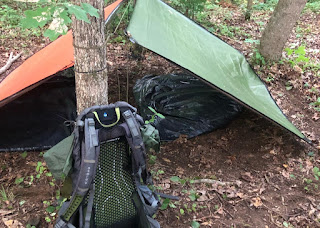I recently returned from a trip to Southeastern Ohio where I attended the Pathfinder School Basic Survival Class. The owner and head instructor is a well known survival celebrity David Canterbury . I started out my little adventure by driving a little over 600 miles to Southeastern Ohio from my home in Iowa. I arrived the evening before and did a little last minute gear shakeout and packing in my hotel room.
The next morning I rendezvoused with the rest of the students at a gas station about 9 miles from my hotel. We where met there by Dave and his two other instructors Shawn Kelly who has a YouTube Channel called Corporals Corner and Paul Haack of Adaptable Survival also on YouTube. I believe originally there where 26 students. We all convoyed to the property where we would be conducting training for the next 2.5 days. After we spent some time getting everyone parked we did a traditional gear dump in the parking lot. The instructors ensured everyone had the required items that had been on the precourse packing list. Once that was verified, we were told to place our camping gear in a separate trailer and put our packs on our back, Nothing was allowed to be taken to training that wasn't on the list with the exception of food that could be eaten on the go. We then walked about 400 meters to the training site. Classes themselves where conducted in an outdoor classroom and 4000 acres of woods and fields.
The first morning consisted of classroom instruction on the 10 C's of Survival: cutting tools,combustion devices,cover,containers,cordage,cotton bandanas,cargo tape,compass,cloth sail needle and candling devices.We went over each section in depth including redundancies and options within each category.We then went over a block on emergency medical care which I will address later. We also had a short class on water procurement.
We then went on about a 4 hour woods walk which got us familiar with the area and also introduced us to various types of tinder and fuel sources. Primarily birch bark,punkwood, fatwood( which I was first introduced to as "lighter knot" back in the 1980's) and the soon to be infamous "smalls". Smalls were dry, dead twigs and sticks no bigger than finger width and from fingertip to elbow. We were told to get a certain amount of each material and carry them along with us. For instance a "softball' size pile of birch bark or two softballs of punkwood. When to came to smalls we needed to fill up at least 3/4 of a 55 gallon 6 mil contractor bag. For reference that is a metric butt ton of smalls.
Upon our return we were shown how to "process" the fatwood into tinder, how to "rescue" a wet BIC lighter, how to make char for fire starting out of the punkwood and finally how to construct a firelay with the smalls and tinder. We then had to perform these tasks to the instructors satisfaction as a "deliverable", Deliverables were graded pass/fail and you were awarded points or more commonly deducted points when not done satisfactorily.
You could only miss 7 points the entire course. Those that met the standard would be "patched" Those that did not could stay but would only get a certificate of training. I struggled mightily getting my fire going and barely got my char going before we had to be back in the classroom. Once we returned to the classroom we had a debrief/question and answer period and instructions for the next day. We were then released to our camp area. We had instructions to be back in the classroom at 0730 and to have all our camping equipment back in the car as we would not be allowed to access our vehicles for the remainder of the course. We also had homework to finish our char, dry out any tinder, and hydrate before the next morning. We had three students drop out of training that evening due to heat injury or lack of motivation.
That night a horrific thunderstorm blew through and kept me awake all night. I didn't get wet but I didn't get much sleep. I also discovered the brand new soles I had put on my boots prior to the course we coming unglued. I had to switch to my trail shoes for the remainder of the course which sucked as it caused me to slip a lot in the mud. The next morning I woke bright and early broke down my tent and took everything up to my vehicle, returning to the classroom with only the packing list items.
That morning the classroom consisted of some very basic land navigation training which consisted of azimuth and pace count only. We also had a class on emergency shelter building using our emergency tarps. We then were tasked with practicing building the shelters until lunch time. After lunch were put into two man teams to run a land navigation course. Each course had a color attached to it and was the traditional point to point style course. Once you found your point the colored tag would give you the azimuth to the subsequent point. We were given 90 minutes to run this course. In addition to running the land navigation during that 90 minutes we had to find enough tinder and smalls to construct a firelay hot enough to boil two canteens of water. We also had to make some tent stakes, and procure a few other items. Upon our return we would have 15 minutes to build 3 shelters and boil the water. This was a "practice" test for the final later in the day.
Myself and my partner struggled. We spent way to much time on the land navigation and didn't have enough time to gather fire material. Predictably when we returned we could only get 2 shelters up because we were screwing around with our fire and never got the water boiled. To top it all off we somehow missed one point on the navigation course so got a zero. We were down 4 points with the final test to go.
Towards evening we were sent out for the final test. We had concocted a plan that played to our strengths. I was the better navigator and he was very good at spotting the colored markers. So I would shoot the azimuth and direct him forward. Generally we would spot the marker with little effort. We finished the land navigation portion in under 30 minutes. This gave us over an hour to gather the required material and a full bag of smalls. Once we got back to the classroom, he started the fire while I got the shelters going. Once I got to a point were I started to struggle we switched and then once again when he hit a rough patch. Using this team work we managed to accomplish the tasks assigned. We also got every land navigation point. We had passed the final test!!
Our final requirement was to sleep overnight in a shelter we constructed. That was no factor as we set our dual shelter up in the dark and went to sleep. Some of the teams would have to retest in the morning but we did not. We woke up and once our shelter was approved we packed up and waited for our fellow classmates to finish up. Once everyone was done we had a class on signal devices and signalling. We then moved to the classroom and were presented with our patches and certificates . I headed home about 1030 on the third day.
The good:
1. I learned some very applicable skills that has made me rethink some of my EDC.
2. I refreshed my land navigation and knot tying skills and identified some gaps.
3. I was happy they had a block on emergency trauma care but the curriculum needs some small updates as far as best trauma practices.
4. I got to spend time outdoors and meet some awesome people.
The bad:
1. Communication was sometimes lacking. For example out group instructor told my team we didn't have to retest the land navigation, the next morning he said we did and when I inquired about the change he asked if we wanted to quit. Of course we didn't so we showed up to retest. He then asked us why we were there and hadn't we been listening. I just apologized for my confusion and walked to the classroom.
2. If you are going to try and run a class in a Ranger School or boot camp style where folks pay hard earned money to attend you better make sure you are on top of your game. I have been belittled and harassed by the most elite members of our military both in Ranger School and Special Forces Selection and the Qualification Course. Its no longer a learning style I think is appropriate. Holding the standard puts enough stress on candidates. Treating them like morons isn't really effective.
3. Some items given as homework were never even checked. If you assign work then check it. Especially if you require students to stay up late to complete.
The ugly:
1. Motherfucking Ticks!!
2. Hot weather
3. Lack of caffeine giving me a headache all weekend
All in all I enjoyed the course. Because of my personal interaction with one of the cadre I don't think I will be back for the intermediate or advanced course. I am however very interested in other training on a similar skill set. If asked to recommend the course I would recommend with a caveat to take some things with a grain of salt

















Sounds interesting . . . Congrats Mike, nice job.
ReplyDeleteThanks for the post
ReplyDelete